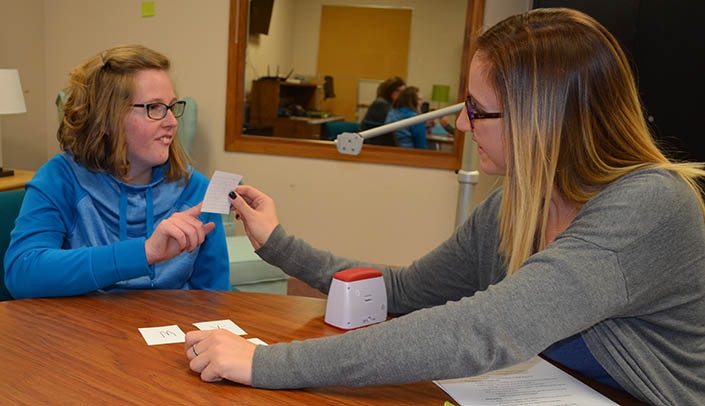Mackenzie Smith taps the flashcard confidently, identifying the letter T.
“Great job!” says Nichole Cordle. “High five!” The two slap hands in celebration.
Cordle is a graduate student in the University of Nebraska at Omaha’s School of Psychology. Mackenzie is a high school senior on the autism spectrum. And they are working together at the Academic Evaluation and Intervention Clinic run by the Munroe-Meyer Institute’s Department of Psychology.
For referrals
To schedule an appointment or make a referral for the Academic Evaluation and Intervention Clinic, please call 402-559-5730. Services are provided at the Munroe-Meyer Institute.
Clinic service hours are Mondays from 4:15-5:15 or 5:15-6:15 p.m.
The semester-long clinic, currently accepting referrals for the spring, is designed to provide academic help to children with intellectual and developmental disabilities, as well as provide parental support sessions on issues such as special education, coordination with teachers, writing strong individualized education program goals, and accessing community resources and respite services.
“We have students from the UNO School Psychology Program who work directly with the students in the clinic,” said Sara Kupzyk, Ph.D., who oversees the program for MMI. “They do assessments to pinpoint the students’ strengths and areas for growth. They then develop an intervention and teach it to the parents, and the parents implement that intervention at home.”
The clinic has helped the family greatly, said Mackenzie’s mother, Stacy Smith.
“It gives us reassurance that we’re on the right track and is helping building our confidence that we’re teaching things correctly,” she said.
Mackenzie is currently learning her letters and numbers, Smith said.
“We just feel that we haven’t met our goal of achieving those things, and we know that there are certain techniques that kids can learn,” she said. “We hope that we can make some progress and achieve whatever goals at Mac’s level that we can.”
Praise has proven to be a key, Smith said.
“A lot of other things don’t motivate her,” she said. “We are keeping track of the progress on what we’re doing, and when you praise her, she works extra hard.”
Reinforcement strategies from the clinic have helped “quite a bit,” she said.
“This definitely is going to make a difference for her.”
The clinic is supported by a Karnett Trust Grant through the United Way of the Midlands, Dr. Kupzyk said.
“The grant has provided us with more time to devote to the clinic,” she said. “We are able to develop these individualized sessions and provide the extended parental support services. It also provides scholarships for families that are attending the clinic.”
